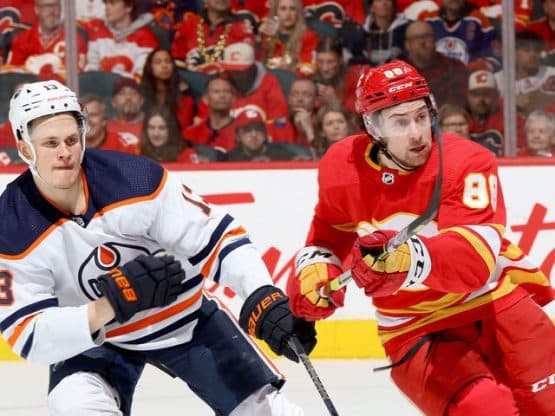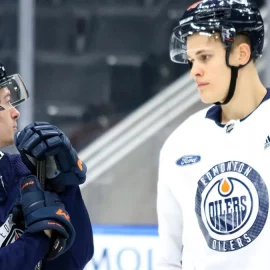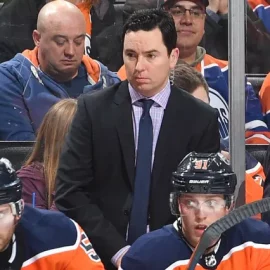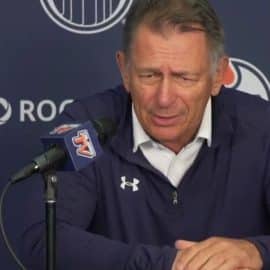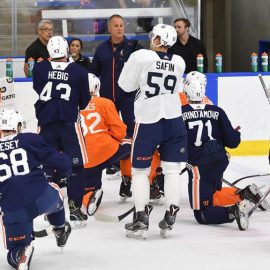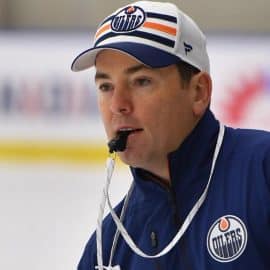The Oilers’ rebuild began when they drafted Taylor Hall in 2010. Six years later the Oilers traded Taylor Hall and the franchise failed to take a single, quantitative step forward that entire time.
So what was the purpose of the last six years? What was the purpose of this rebuild at all?
When the Oilers began their rebuild back in 2010, I became interested in looking at other rebuilds and how teams go through the process.
Most teams have a life cycle: a rise, peak and eventual decline.
For some it is spread over a number of seasons, a few may experience it over a decade or more. Ideally a franchise goes through the cyclical process of creation, destruction and re-creation with minimal interruption.
I think by now most Oiler fans would agree that the experience of rebuilding can be a long and painful one. I’m sure many today believe that, in our case at least, it is as though we are trapped on a wheel, perpetually turning but ultimately arriving at nothing.
The thing is we’re here as fans now, helpless on the journey we’ve been taken on and ten years deep into a rebuilding process that has just purged the very core of the talent they set out to acquire in the first place.
Now maybe it is just my nature, but in times like this I tend to get a little introspective and search for the things I can learn or take to heart from these series of unfortunate events.
So when I started thinking about the rebuilding process and how teams are built, grow, sometimes thrive, and then dissolve into history, I got to thinking about the Hindu motif of the mandala, an image of a wheel that is used to depict the idea of the great cycle of existence, from reincarnation to the concept of eternal return.
So this article is going to talk about the Hockey Gods, or something like it.
Fickle Fates On the Ice
The Hindu mythology anthropomorphizes the universal rotating patterns of preservation, creation and destruction in the form of the gods Vishnu and Shiva, the Preserver and Creator/Destroyer, who have their places and roles on the Sacred Mandala. One exists in collaboration with the other, as there cannot be creation without the destruction of that which has gone before and likewise the opposite. In all, there are three deities in the relationship, Brahman being the third who is the overseeing totality that everything else, including Shiva and Vishnu, come from.
Now, you may think that this is all kind of a ridiculous thing to write about for a hockey blog. Maybe you’re right, but I’m going to do this anyway and I’d encourage you to hear me out to the end because I think some of this could apply to our experience as fans.
I’m going to start by introducing three of the principal aspects of Hindu divinity and illustrate how they relate to hockey and the Oilers in particular.
Vishnu is usually referred to as the Preserver of the Universe, the one that is associated with the maintenance of the present and the preserver of creation. After the 2006 Cup run the Oilers tried to get in with this guy, thinking that they could hold back the setting sun and have another go at a championship.
It didn’t work.
You see, Vishnu is a strong god, an admirable one, and appeals greatly to the human spirit because in the face of ever-present disintegration, people work hard every day not just to suspend decay but to build against it, to grow and prosper. We are naturally inclined to resist inevitable breakdown of our world. Vishnu represents order and the proper position of things in the world.
But Vishnu is only one aspect of the spiritual trinity in Hindu belief.
Another aspect of the wheel is Shiva, often described as the Destroyer, but perhaps better thought of as the Transformer. Much like the Death card in the Tarot, the aspect of Destruction associated with Shiva can be misinterpreted in purely negative terms, that is, a destroyer who brings only devastation and void.
But that isn’t entirely fair to Shiva. You see, Shiva isn’t necessarily an active destructive force that delights in carnage, but rather a god of change and transformation who oversees the alternation between phases of existence, in the same way that a lumberjack can be imagined to be a caretaker of a forest, though he cuts down the trees, he also oversees the growth of their eventual successors.
Oilers fans know Shiva very well. We have watched his handiwork send wave after wave of players out of the city in the name of change that hasn’t come. In fact, the concept of Shiva is one that I believe many are struggling with right now. Destruction can be both a frightening and compelling force, it is one that simultaneously can fill us with mortal dread and inspire us to great and terrible things.
It is also often the first component of growth and this duality, this contrast and seeming contradiction sits with us like a great lead weight in our souls that we try to ignore and look past. To embrace destruction courts nihilism and a love of it for it’s own sake, to avoid it at all costs risks atrophy and degradation by degrees over time. It is in the space in between, that quiet and steady decline, like the subtle tumbling of the gears in a clock, that most of us reside, standing with two satchels in our hands: Fear and Hope.
We Know Suffering
There is a concept in Buddhism, derived from the Hindu belief system, of the Four Noble Truths centered around the idea that the human condition is formed by suffering, dukkha (literally: suffering, anxiety, dissatisfaction). I don’t mean “I shouldn’t have eaten those arena nachos” suffering, something more spiritual, like “man, I’m turning 46 and what the hell have I done with my life?” kind of anxiety.
The Truths provide a path first to ending suffering and then to overcoming it. They attempt to explain that the nature of it is grounded in the suffering of humanity over the physical aspects of life; pain, illness, aging and death.
In short, they try to help us explain, or maybe instead just cope with, what is the meaning of all this.
The first Truth, about anxiety, is inherent because of our desire to retain moments in time and hold on to places, states and people, all the while seeing that they are slowly fading away and that we are powerless to prevent the passage of time.
I’ll give you an example.
It was brief, and shortened due to injury, but Connor McDavid’s rookie season was one most fans will always remember. Yet it is gone now, forever. We wring our hands thinking of this wasted year, of another petal gone from the bloom of his youth, knowing that with each season we grow simultaneously closer to greater things and an eventual, hopefully distant, end when he leaves the city.
The second Truth suggests that the origins of suffering can be known, and that at its foundation, suffering is a craving conditioned by ignorance. For those familiar with the Judeo-Christian tradition, Envy and Desire might be a more familiar translation for it in this sense.
For this topic let’s translate ignorance as “delusion” over reality. In other words, delusion as to the true state of things leads to the persistence of suffering because it only begets more craving and more pain derived from investing in the present despite its impermanence.
Okay, so in more clear language let me put it this way…
It was delusion that led the Oilers to where they found themselves at the end of the 2009-2010 season, and arguably delusion has been a running theme ever since. Delusion that they could build around a core of Gagner, Cogliano and Nilsson after 2007. Delusion that they had completed a rebuild following the drafting of Taylor Hall and Ryan Nugent-Hopkins. Delusion that the defence they had assembled under Craig MacTavish was in any way adequate for an NHL roster. It was all fostered by Envy of the other teams that had successfully rebuilt prior to them, namely Chicago and Pittsburgh, coupled with an ignorance of their own Envy that resulted in a series of fundamental mistakes in how they evaluated where they were, what they had, and what they needed to do from that point on.
In the same way we could say that it may well be delusion that led Peter Chiarelli to decide that losing Taylor Hall was an appropriate price to pay for the gain of a right-handed defenceman. Time will tell.
The third Truth is that suffering can be ended.
It may feel like a far-flung fantasy right now, but other teams have rebuilt themselves into competitive teams, even winning championships. The Oilers may yet find a way to do so as well. This Truth is most valuable at moments when everything appears to be hopeless and your suffering eternal, because it is in moments like this that serious, fatal mistakes can be made out of an almost nihilistic desperation to make a change if only to alter the source of the pain.
I don’t think we can suggest this Truth to the Oilers. I think they passed it without a second glance. It may be more appropriate now to recommend that fans take a long hard look at this today. It may not bring any comfort, and to be honest I’m not entirely sure that it was ever meant to. Instead, it may be that the promise that suffering can end is only there as a stopgap until we gather enough courage to take the difficult next step.
The fourth Truth outlines Buddha’s path to ending suffering and achieving enlightenment. I won’t go into specifics here, but if I were to translate the general gist of it to hockey terms it would be to find a middle path between radical extremes. To neither hold fast to the past nor seek aggressively to initiate the future. Rather, step back, observe the flaws around you and make thoughtful, sober changes to correct them.
In Oiler terms this means finding a path between the “Trade Them All!” and “Don’t Break Up the Core” camps that divide the fan base. Detroit has managed this balance for nearly two decades as they have gradually ushered in new talent and let established players depart, never losing sight of the goal of being champions but also not overreacting to the pitfalls and failures that have happened along the way.
Hope?
But what do we do as fans? How do we resolve within ourselves the experiences of so much angst and suffering as we have waited patiently all these years, oh so very patiently, for the wheel to spin around again and bring us out of the destruction phase and into the clear sunlight?
One of the many tenets of Hinduism is that one should focus on the present, the journey so to speak, rather than the destination. Separating the present from the future is difficult in the cause-and-effect world of professional sports; it is an inherently serial existence where one action is inevitably linked to another, the passing of one player often tied into the rising of another thus keeping much of the focus perpetually on the horizon, every loss or victory is only a gateway to the next game.
Varun Soni, a journalist at the Huffington Post, wrote an article that discussed this exact idea. He is a lifelong Clippers fan (speaking of suffering) and his article is essentially about how being a Clippers fan has made him a better Hindu as he now understands the concept of living in the moment and separating oneself from the past and future. It is well worth a read, especially for any long-suffering hockey fan.
Taylor Hall is gone. We are unlikely to see another player like him on the Oilers for a long time. Dwelling on our anger or resentment will not move us forward, nor does ignoring what has been lost. Instead we must hold our hands out in both directions, to the past and the future, and while doing so be mindful of our present.
Because here we are, entering Connor McDavid’s second season (may it be a long, healthy and productive one) and if we focus too much on the future or dwell overlong on the past we risk missing the enervating thrill of the very moment in which we are cradled.
And that would be a sin.
This past week the wheel turned again and we began to see the vestiges of the previous era dispersed as mutability and change returned to our little world.
So on and on we go, the destination seems almost trivial now. Therefore, let us as least enjoy the journey.
*I am not a practicing member of the Hindu or Buddhist faith. I have interpreted the tenets and principles behind those faith systems to the best of my ability and, in my own clumsy way, have wed them to the parallels I have observed in the nature of sports fandom. It is not my intent to give offense or make light of these beliefs and traditions and would sincerely hope that readers indulge me in this regard. Thank you for reading.
Add The Sports Daily to your Google News Feed!



